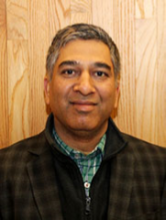CEE Seminar: Innovations in the N-Cycle & their Engineered Applications

Associate Professor
Civil & Environmental Engineering
University of Utah
Abstract: Nitrogen (N) is an essential nutrient required of all organisms on the planet. In excess, it causes severe environmental problems. Due to the modern urbanization and rapid population growth, the nitrogen cycle has been significantly disturbed within differing ecosystems. Focusing specifically on imbalances present in an aquatic ecosystem, it is imperative that the wastewater engineering community addresses the need to conserve energy and resources better by developing more effective tools for application in wastewater treatment plants. The Academy of Engineers recently identified nitrogen cycle management as one of the 14 predominant challenges that engineers need to address in the immediate future. This validates a definite sense of urgency to find practical solutions for implementation in wastewater treatment plants. In order to determine the best means for effective nitrogen cycle management, an in-depth examination of disturbances in the cycle provide an understanding of what is needed to resolve these issues. New findings have modified the overall nitrogen cycle. Novel pathways of nitrogen transformation were incorporated with the discovery of new groups of prokaryotes that play an important role in both engineered and natural ecosystems. For example, recent findings reveal the existence of anaerobic oxidation of ammonium to dinitrogen gas through nitrite as an electron acceptor. Another recently discovered pathway is the denitrification process wherein the reduction of nitrite or nitrate is coupled with oxidation of methane, which is undertaken by a novel enzymatic pathway. An in-depth microbial analysis has revealed that Nitrospira-like species catalyze the process of complete oxidation of ammonia to nitrate without any intermediate step and provides a unique pathway by redefining the traditional nitrification process in the biological nitrogen cycle. This presentation will first provide an overview of the overall N cycle followed by in-depth knowledge and importance of these new N transformation pathways. The presentation will also provide results on comprehensive whole community metagenomics of N transformations in engineered reactors.
Bio: Ramesh Goel is an associate professor of environmental engineering and microbiology at the University of Utah where he started as an assistant professor in 2006. He obtained his doctorate in environmental engineering from the University of South Carolina with Joe Flora and his postdoctoral research training at the University of Wisconsin with Daniel Noguera. Goel was a visiting faculty at Radboud University, the Netherlands and EAWAG, Switzerland in 2014. He researches nitrogen and phosphorus cycling in engineered and natural ecosystems, resource recovery from urban waste streams, bacteriophage mediated bacterial diversity (through gene transfers) in engineered reactors, natural ecosystem and human gut microbiome and in determining the tipping point in natural ecosystems for harmful algal bloom formation. He uses advanced high throughput DNA and RNA sequencing followed by bioinformatics to study prokaryotic diversity, ecophysiology and abundance in different systems. He is the recipient of NSF’s prestigious CAREER award, American Society For Microbiology’s professorship to India and numerous research and teaching related awards at the department and college levels. He has been serving as graduate director of the department, the chair of AEESP Lecture committee, chair of WEFTEC research symposium committee, secretary of the United States of America National Committee of IWA, member of AEESP student services committee, associate editor of Water Research, Water Environment Research and Current Pollution Reports.
Share
Download
Upcoming Events
-
MAE 298 SEMINAR: Co-Designing Mutual Aid Transportation for Disaster Resilience
-
CBE 298 Seminar: Engineering Strategies for Structural Heart Disease
-
MSE 298 Seminar: Radiation Resistance and Mechanical Response of Ceramics in Extreme Environments
-
MAE 298 SEMINAR: Stretchable Electronics for Soft Biological and Robotic Systems
-
CBE Distinguished Lecture/CBE 298 Seminar: Computational Design of Peptides as Detectors, Sensors and Drugs
